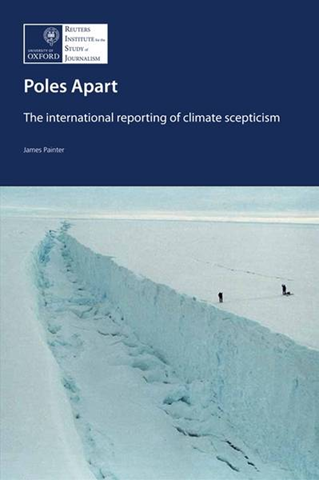Is denial of climate change an Anglo-Saxon phenomenon? New study shows denialists more prominent in U.K. and U.S. media
During a trip to Italy earlier this year, I asked a local journalist whether climate sceptical views get much of an airing in the Italian media. My query was greeted with an air of slight bemusement, which was followed by a request for me to explain what I meant by the term “climate scepticism”. Their facial reaction alone told me that this was something of an alien concept to them. It supported a hunch I have long believed to carry some substance: climate scepticism is a predominantly Anglo-Saxon phenomenon. Or, rather, it is a phenomenon that tends to gets amplified to a much greater extent in the various English-language media outlets around the world – particularly, in the US, UK and Australia – than it does in other languages or countries. Until now, there has been very little beyond the anecdotal to support this theory. But the proposition is now on a firmer footing thanks to a new report published by the Reuters Institute for the Study of Journalism, based at the University of Oxford, which firms up some related findings it published last year. In “Poles Apart: The International Reporting of Climate Scepticism” [executive summary pdf], a team of researchers, led by James Painter, a former BBC World Service journalist with a specialism in analysing how climate change is portrayed in the media, conducted a comparative study of the prevalence of climate sceptic voices in the print media across Brazil, China, France, India, the UK and US. More than 3,000 articles from at least two different newspapers in each country (10 from the UK) were analysed over two separate three-month periods: February to April 2007 and mid-November 2009 to mid-February 2010, the latter including both the Copenhagen summit and fallout from the theft of emails from the University of East Anglia. The “political leaning” of each newspaper (except in China) was also taken into consideration. The report undertakes the important and necessary task of defining and discussing the various types of climate sceptic – something it later stresses should be better emphasised by journalists. For example, there are the “trend sceptics” (who deny the warming trend), the “attribution sceptics” (who accept the trend, but attribute it to natural causes) and the “impact sceptics” (those who accept human causation, but claim the impacts will be beneficial or benign). Then there are the policy sceptics; those who, for a variety of (often political or ideological) reasons, disagree with the regulatory policies being promoted to tackle climate change. Then, finally, there are the science sceptics; those who – again, for a variety of reasons – believe climate science not to be trustworthy. The report also lists four examples of different sceptics – Pat Michaels, Steve McIntyre, Lord Monckton and Bjørn Lomborg – to illustrate their often contrasting motivations and methodologies in expressing their equally various types of scepticism. […]

Rupert Murdoch
You know how to run a Search. Try checking on the BBC's traditional position on AGW/Climate Change/Climate Weirding.
Biased BBC will give you an earful. Blair – the same stalwart who sold the Iraq War in 2003 – is listed as a proponent of note. If you have any idea of the propaganda ginned up in media skepticism should be innate.
( Yes,I have posted on this.)
After all, how much attention has been paid to your hobby horse of ozone pollution – a known and monitored problem alleged by some to have been hyped – while noting damage to trees…which we agree on.
I bumped into a lead on a thread at JoNova the other day and used DeepSearch on it.
http://opitslinkfest.blogspot.com/2011/11/13-november-environmental-politics.html
Sample article http://hubpages.com/forum/topic/30553
And the plot is stranger yet
http://www.grist.org/energy-policy/2011-11-14-has-government-spending-on-energy-research-been-a-waste
My note references Secrecy News – but I didn't bother chasing down those particulars http://www.rwgrayprojects.com/energy/usg01.html
At the back of my brain is nagging one item in recollection : that deposits in the ground represent stores of concentrated sunlight which are irreplaceable. If practically true…green energy may be a mirage.
In any case, hiding needed tech leads to one conclusion….failure of technical civilization.
I also think it is an anglo-saxon phenomenon. That's why India, China and Japan have ignored the IPCC, opted out of Kyoto and will likely ignore the Durban summit. All of them are clealy anglo-saxon countries.